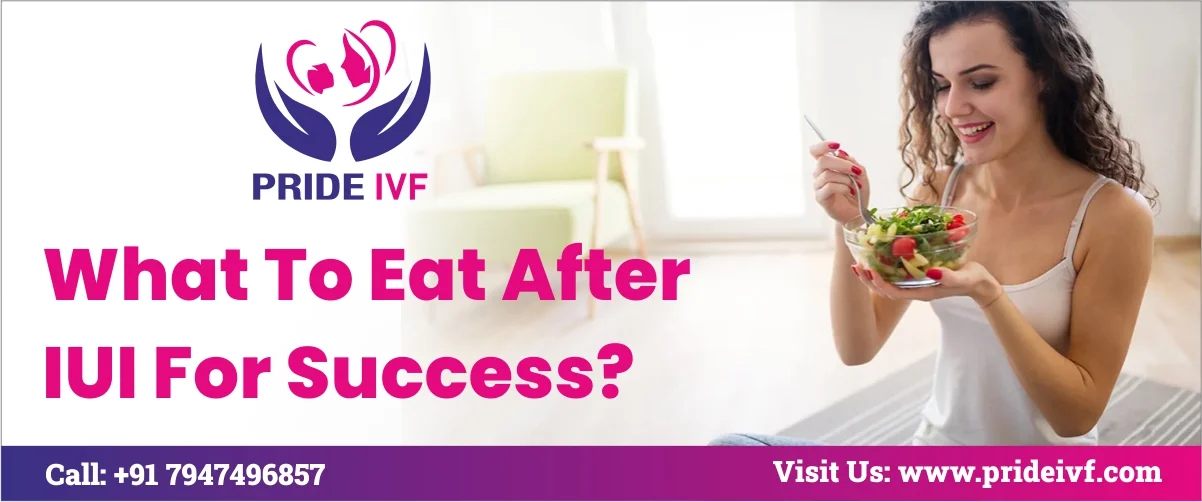After undergoing an IUI procedure, it’s essential to focus on what to eat after IUI for successful results. The food you consume plays a vital role in supporting your body. It enhances the possibility of a successful outcome. Understanding the right foods to eat and those to avoid after an IUI can significantly impact the process. Let’s explore the importance of post-IUI nutrition and its contribution in your journey towards a successful conception.




What To Eat After IUI For Success and Why?
After undergoing an IUI procedure, nutrition plays a crucial role in supporting your body’s recovery and optimizing your chances of conception. Consuming the right foods can assist in hormonal balance, promote uterine health, and improve overall fertility. Here’s a comprehensive look at what to eat after an IUI treatment in delhi for success and the reasons behind these dietary choices:
-
Nutrient-Rich Foods
Eating foods like fruits, veggies, whole grains, lean meats, and good fats is really important for IUI success. Veggies like spinach and broccoli, along with lean meats such as chicken and turkey, are perfect examples. Take folic acid in leafy greens and citrus fruits, for example. It helps build cells and keeps the baby healthy right from the start by lowering the chances of certain birth issues like neural tube defects.
-
Protein Sources
Proteins are made up of amino acids, which are the building blocks of cells. After an IUI procedure, incorporating lean protein sources like chicken, fish, beans, and tofu aids in tissue repair. It also supports the development of follicles and embryos. Adequate protein intake is essential for the development of a healthy placenta and fetal tissues during pregnancy. For more guidance and recommendations, Dr Nidhi Sharma at the International Pride IVF Centre can be really helpful in this matter. She is a renowned infertility specialist in india and does IUI, IVF, and other fertility treatments at fertility clinic in Delhi.
-
Omega-3 Fatty Acids
Omega-3s, found in salmon, chia seeds, and walnuts, are like superheroes fighting inflammation and keeping your hormones in check. They help out with stuff like menstrual cycles and how your uterus works. Plus, they help make sure your uterus is all set for the embryo after an IUI.
-
Complex Carbohydrates
Complex carbohydrates are found in whole grains like brown rice and quinoa. They have a lower glycemic index compared to refined carbohydrates. They provide a steady release of glucose into the bloodstream. This prevents rapid spikes and drops in blood sugar levels. Stable blood sugar levels prevent insulin fluctuations and maintain hormone balance, which is essential for a successful pregnancy. Hence, knowing what to eat after IUI for success can help you do all the right things required for pregnancy.
-
Hydration
Adequate hydration is vital for overall health and fertility. Water plays a crucial role in maintaining optimal cervical mucus consistency. Properly hydrated cervical mucus aids sperm motility and transport, assisting sperm in reaching the egg for fertilization.
-
Foods Rich in Iron and Calcium
Spinach and lentils are iron-rich foods that support healthy blood circulation. Now, these foods are also important for the formation of hemoglobin. We already know that hemoglobin carries oxygen to cells and tissues, including the uterine lining. On the other hand, adequate calcium intake from dairy products, almonds, and leafy greens contributes to uterine health and muscle function. These are some of those foods to help implantation after IUI.
-
Herbal Teas and Supplements
Certain herbal teas, like red raspberry leaf tea, contain compounds that may support reproductive health. Red raspberry leaf is believed to tone the uterus and pelvic muscles, potentially aiding in implantation. Prenatal vitamins and supplements may provide additional nutrients critical for early fetal development and a healthy pregnancy, but it’s crucial to consult a healthcare provider for personalized guidance.
Overall, these food choices are beneficial due to their nutrient content, anti-inflammatory properties, hormonal regulation, support for uterine health, and their roles in providing essential building blocks for fetal development and healthy pregnancy. After going through the IUI procedure step by step, you should follow these nutritional choices strictly to ensure its success.
Lets get started
What Not To Eat After IUI For Success and Why?
Ensuring a nourishing diet after an IUI is key to fostering an ideal setting for conception and a healthy pregnancy. Steering clear of specific foods that might jeopardize maternal and fetal well-being becomes pivotal in supporting this path toward successful IUI results. Below, we have listed the foods to avoid after IUI.
-
High-Mercury Fish
Avoid fish high in mercury, like swordfish and king mackerel, as excessive mercury can harm fetal development and interfere with conception. Mercury accumulation in fish can negatively impact the fetus’s nervous system and brain development.
-
Excessive Caffeine
Limit or avoid excess caffeine as it can disrupt hormone levels, potentially affecting implantation and fertility. High caffeine intake may increase the risk of miscarriage in early pregnancy.
-
Alcohol
Abstain from alcohol post-IUI as it can disrupt hormone levels, impair fertility, and heighten the risk of miscarriage. Even moderate alcohol consumption can negatively impact fertility and fetal development. This can be a painful experience, unlike the often-asked question is IUI painful process.
-
Acidic Fruits
After an IUI procedure, it’s often recommended to steer clear of acidic fruits. For instance, fruits like oranges and pineapples can cause irritation. These fruits, with their high acidity, might not be ideal for the sensitive post-procedure phase. Additionally, high-impact fruits like papaya or pineapple are advised against. They could interfere with the uterine lining, potentially affecting the implantation process. Hence, these are the fruits to avoid after IUI.
-
Processed and High-Sugar Foods
Minimize processed foods and those high in added sugars, like cookies, candies and cakes, sweetened yogurts, and canned fruits, as they can induce inflammation and insulin resistance, impacting hormonal balance and reducing the chances of conception.
-
Trans Fats and Hydrogenated Oils
Avoid foods containing trans fats and hydrogenated oils as they increase inflammation and can disrupt hormone production, potentially affecting fertility and reproductive function.
-
Unpasteurized Dairy and Soft Cheeses
Refrain from unpasteurized dairy and soft cheeses to avoid potential bacterial infections like listeria, which pose risks to both maternal and fetal health.
-
Raw or Undercooked Meats
Steer clear of raw or undercooked meats to prevent exposure to bacteria like salmonella or toxoplasma, which can cause infections potentially affecting fetal development and health.
By avoiding these foods post-IUI, you can reduce potential risks to both maternal well-being and fetal health. These precautions aim to maintain a conducive environment for successful conception and a healthy pregnancy.
Conclusion
Post-IUI nutrition is a crucial factor in optimizing your body’s readiness for successful conception. Hence, you should be fully aware of what to eat after IUI for success. By embracing nutrient-rich foods like fruits, lean proteins, and omega-3 sources, you fortify your system for potential implantation and fetal development. Conversely, avoiding high-mercury fish, excess caffeine, and other detrimental elements minimizes risks, promoting a conducive environment for a successful pregnancy after IUI.
When it comes to getting pregnant after IUI, having the right doctor like Dr. Nidhi Sharma from the International Pride IVF Centre can really make a difference. She’s great at helping with IUI and can guide you on what foods are best for you. With her help, you can make sure you’re eating the right stuff to boost your chances of having a baby.




